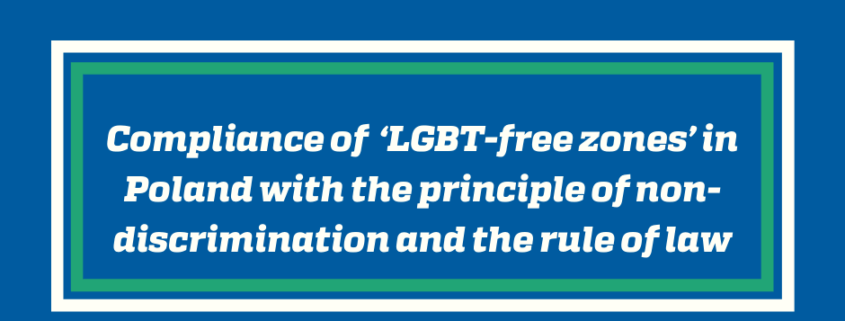Written question to the European Commission
Since 2019, more than 100 Polish regional or local authorities have declared themselves ‘LGBT-free zones’ or adopted regional charters of family values pledging not to take any action to encourage tolerance towards LGBTI people nor provide financial assistance to NGOs promoting equality.
These resolutions are contrary to the spirit of the EU treaties and to the objectives of EU programmes. They represent a threat to the rule of law and LGBTI people’s fundamental freedoms, as they legitimise discrimination and may ultimately fuel further hatred.
On 21 July, the European Council approved the Next Generation EU recovery plan. Paragraph 22 of the Council conclusions stresses the need to protect the rule of law and the Union’s financial interests in accordance with the general principles of the Union Treaties, in particular the values laid out in Article 2 TEU. Paragraph 23 provides that ‘a regime of conditionality to protect the budget and Next Generation EU will be introduced. In this context, the Commission will propose measures in case of breaches for adoption by the Council by qualified majority’.
1. What actions does the Commission intend to take to identify subnational policies that jeopardise the rule of law and LGBTI people’s rights?
2. How does the Commission intend to prevent regional and local authorities from using EU funds to finance illiberal and anti-LGBTI policies?
Answer given by Commissioner Dalli on behalf of the European Commission
The Commission monitors the developments as regards the rule of law in all Member States, and adopted its first annual Rule of Law Report on 30 September 2020.
In her State of the Union Address, the President of the Commission made clear that discrimination against lesbian, gay, bisexual, trans, non-binary, intersex and queer (LGBTIQ) people has no place in the EU. National authorities, at all levels, must respect common values and fundamental rights.
Rule of law and fundamental rights, including the principle of non-discrimination, enshrined in Article 2 of the Treaty on European Union, are among the core values that are essential foundations of both the Union and all of its Member States.
The principle of non-discrimination also applies to all EU funding under direct, indirect and shared management. Furthermore, in the framework of the Technical Support Instrument, the Commission will thoroughly assess Member States’ requests to receive structural reform support and make sure that only those in line with EU values and principles will be accepted. The Commission will continue to monitor the situation in Poland and make sure that, when implementing EC law and EU funded projects, the principle of non-discrimination is fully respected.
The Commission will continue to promote a Union of Equality, one of the major priorities of the President of the Commission. In this context, the Commission presented a LGBTIQ Equality Strategy on 12 November 2020.




Leave a Reply
Want to join the discussion?Feel free to contribute!